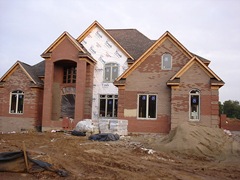Just for fun, today let’s play journalist and headline writer.
Here are the morning’s facts that we have to work with: 1) For the month of July 2010, the Case-Shiller 20-City Home Price Index was up 0.6% and the 10-City was up 0.8%. 2) For the year to July, the indexes are up 3.2% and 4.1%, respectively. 3) House prices are now at the level they were in fall 2003, but are still about 50% higher than they were in January 2000.
Okay, so what’s the headline you would use for your story reporting this news? Here are some I think would be appropriate:
“July Brought More Modest House Price Increases”
“S&P Case-Shiller at Highest Level Since ‘08”
“House Prices Continue Recovery Despite Tax Credit Expiration”
Or, taking more of a big picture approach:
“With Dust Settling, House Prices Hold on to Half of Boom Gains”
Read more »
Last year I wrung several good posts from the Obama Administration’s doomed-from-go scheme to get banks to modify mortgages. It was good material for me. I got to mock both those few who were clueless enough to think it might work and the great many people who were too polite or too loyal to the White House to admit that they understood that the program’s outlook was grim.
think it might work and the great many people who were too polite or too loyal to the White House to admit that they understood that the program’s outlook was grim.
After a while, I got bored of beating that particular dead horse. So many other things to mock.
But I realized recently I never really addressed the basic conceptual flaw in the Home Affordable Modification Program. This came to me as I was reading a recent guest post at Smart Spending, a blog that carries many thoughtful guest posts.
Read more »
This is actually two questions in one. There is the personal finance version: Is owning a house a shrewd move for a consumer? And there is the broader policy one: Is home ownership something that the government should be  encouraging as much as it does?
encouraging as much as it does?
Both are good questions. The first is of great practical importance to many people. But the second is probably more interesting. And it is nearly impossible to discuss one without the other.
Brett Arends at the Wall Street Journal gives it a good try in his latest column, taking as inspiration a recent Time cover story that is entirely on the policy question, to write on the personal finance version.
He starts out by making the point that a Time cover reading “Rethinking Homeownership” is as good a sign as any that the real estate market is bottoming out. He shows us a 2005 Time cover reading “Home $weet Home” that was, in hindsight, a clear indication that the market was then about to peak. I do not disagree, but I would have been much more impressed with Arends if I hadn’t read this blog post at The Big Picture two days earlier that made the same point with pictures of the same two Time covers.
Read more »
 On Saturday The New York Times discovered yet another example of evil business fleecing wholesome Americans. Resale Fees That Only Developers Could Love opens with the usual tropes.
On Saturday The New York Times discovered yet another example of evil business fleecing wholesome Americans. Resale Fees That Only Developers Could Love opens with the usual tropes.
Rebecca and Trent Dupaix of Eagle Mountain, Utah, spent a year searching for their dream home. The couple, who have five children, considered 15 to 20 houses before finding “the one.”
But four months after buying the “rock-and-stucco home” the dream turns to a nightmare when
the Dupaixs discovered that their sales contract included a “resale fee” that allows the developer to collect 1 percent of the sales price from the seller every time the property changes hands — for the next 99 years.
Incredibly, the resale fee arrangement was apparently not disclosed to the Dupaixs, something that is either outright fraud or spectacular incompetence on the part of the title company and whoever ran the closing. It can be inferred from the article that the Dupaixs did not have a lawyer.
Read more »
Late August had more angst and gloom about the housing market than usual. Had I been blogging last week, I would have written about it on the last Wednesday of the month, my usual housing market slot. (The Case-Shiller Index numbers come out on the last Tuesday.)
Wednesday of the month, my usual housing market slot. (The Case-Shiller Index numbers come out on the last Tuesday.)
The proximate cause of the wave of pessimism were two reports on the low levels of house sales in July. The National Association of Realtors revealed that existing home sales were down 27% in July from June. And sales of newly constructed houses fell 12.4% to a new all-time low.
The New York Times reported this with the headline Housing Market Plunged in July, Fueling Anxiety. Anxiety may indeed be being fueled, but the housing market, at least the one most of us care about, did not, as far as we know, plunge in July.
Read more »




